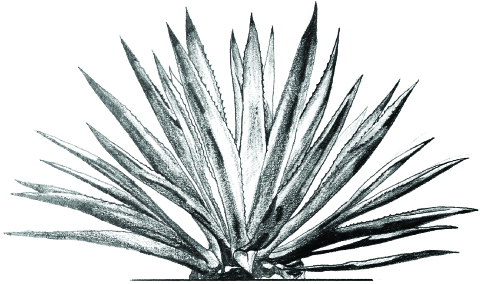Microclimate, terroir-driven spirits of Mexico…
OVERVIEW:
The most unique characteristic and selling point about PUNTAGAVE RUSTICO is that it delivers “complexity of character” rather than the “consistency of characters” possess by PUNTAGAVE ARTISANAL.
PUNTAGAVE RUSTICO different denominations of origin are a departure from the “business as usual” tequila concept because it delivers “complexity of character.” It does it by featuring a variety of spirit appellations highlighting agave flavors. These species of agave grow in differing altitudes and micro-climates and just like wine, these agave denominations are a result of weather, terroir, and unique agave varietals. What does this mean? What it means is that PUNTAGAVE RUSTICO will demonstrate by aromas and taste profiles that “Terroir” exist in agave the same way the wine industry has demonstrated it exist in grapes. “Terroir” is the centuries old knowledge that crops draw their “character” from the soil, sun, and temperature they are grow in.
Every denomination of PUNTAGAVE RUSTICO is a unique product of a specific micro-climate, time, and method of production. it’s truly special, “It shifts, it moves, it’s a profound and unique experience.
TEQUILA
TEQUILA is technically a Mezcal: However, there are differences in production and types of agave used. Tequila is made from a single type of agave plant –Agave Tequilana Weber a.k.a. Blue Agave – and can only be produced in the state of Jalisco and four other bordering states.
“All tequilas are Mezcal but not all Mezcals are tequila.”
There are two mayor agave growing regions for tequila, the highlands (Los Altos) and the tequila valley at 3,700 meters above sea level. For years producers and consumers have been debating which agave produces the best tequila? One thing is for certain, that the rich red soil from the highlands is very porous and the rain water filters right-through, leaving these agaves extremely stress for survival. Highland agave yields the highest grades of sugar content. There is a popular claim that the highlands rich soil produces a sweeter, more citrus, and fruitier-tasting profile. PUNTAGAVE Tequila is produced with highlands grown agave in the town of Jesus Maria Jalisco.
PUNTAGAVE RUSTICO tequila with lower alcohol content (80-Proof) than the other Puntagave Rustico denominations is perfect to get your palate ready for the more powerful and idiosyncratic denominations. Mezcal 84, Raicilla 88, Sotol 86 and Bacanora at 90_Proof.
MEZCAL
MEZCAL distilleries are called Palenques and Agave is also known as Maguey.
For most Americans, agave is best known in the form of tequila — essentially a more industrialized form of mezcal, localized in a few specific appellations of Mexico (though, of course, there is artisanal, terroir-driven tequila, just not much of it).
PUNTAGAVE RUSTICO Mezcal is produced using a more ancient form of distillation that has retained deep ties to indigenous cultures across the country, while tequila is made from one variety of agave. Mezcal’s allure is that it can be made from a wide range of varieties that, much like wine-grapes, look and taste unique and respond differently to environment.
Most traditional Mezcals are made from Agave Espadin like ours, although some mezcal producers blend agave varieties to create a distinct flavor.
Mezcal traditionally has a unique, smoky flavor that makes it fairly easy to distinguish from tequila. It also tends to taste sweeter, richer, and smoke-filled than tequila.
The biggest difference between tequila and mezcal is that when tequila is made, the agave head is baked mainly in autoclaves or in an above-ground oven. Mezcal producers, however, often follow the traditional method of using underground pits. A fire is started and burns for about 24 hours to heat the volcanic stones that line the pit. The agave heads are put into the pit and then covered with moist fiber that is left over from the fermentation process. A layer of agave leaves or woven palm leaves cover the fibers and the agave heads are left to cook two to three days.
RAICILLA
RAICILLA distilleries are called Tabernas.
Produced for over 500 years in the coast of Jalisco, Raicilla is an Agave Spirit that in the 1780’s in order to avoid a tax levied by the Spanish Crown it became an illegal moonshine dealt in the back streets of Puerto Vallarta. The potent brother of tequila yields drunken stories by tourists from all over the world. Jalisco offers a plethora of agave species, second only to Oaxaca. These, along with great diversity in terroir, equipment and techniques, gives Raicilla an amazing spectrum of flavor and history.
Our Raicillas come from two different tabernas and it is produced with Rhodacantha and Maximiliana Agaves. Raicilla made from Rhodacantha enjoys high acidity and distilled at a high 88_proof provides a big-bang profile that can be enjoyed straight-up “ay caramba” or it can also be used to create amazing cocktails.
PUNTAGAVE Raicilla is produced in the village of Llano Grande of the coastal region Cabo Corrientes, 700 meters above sea level. Agave Rhodecantha matures after 12 years. The agave is roasted in an earthen pit, distilled two times in a Philippino still made from copper and a hollowed-out tree trunk.
You can think of raicilla as a pre-hispanic, moonshine-style version of mezcal, distilled in the Jalisco coastal towns like Puerto Vallarta and its surrounding little villages such as Mascota, El Tuito, and Cabo Corrientes, among others.
sotol
SOTOL Distilleries are called Vinatas.
While tequila is known worldwide, Sotol is a connoisseur delight and one of Mexico´s best kept secrets. It is an extraordinarily pure spirit with its own denomination of origin, highly valued for its rich flavors.
It is an organic agave, wild-harvested in the Chihuahuan Desert of Northern Mexico which takes 15 years to mature. In the desert’s harsh climate, only the strongest and healthiest plants survive this natural selection process. Maturing on the mountainsides, the plant stores vast amounts of natural energy before it is ready to be harvested. No herbicides, no insecticides, no fertilizers.
Each bottle contains the distilled nectar of an estimated 15-year-old plant, providing the richest agave scent and flavor one can find in a Sotol.
From there, José Daumas “Pepe”, our in-house master distiller, who received his Master’s degree in enology at the world renowned École Nationale Supérieure Agronomique de Montpellier, France and whose résumé includes a plethora of well-respected brands such as Martell, Larsen & Moet Chandon, meticulously oversees our state of the art production process which starts by slow steam cooking the wild-harvested plants, naturally ferment them with champagne yeast and distilled in a double-column copper still.
BACANORA
Bacanora was banned for 77 years (1915 - 1992) due to Prohibition. Hidden from the public eye but refusing to disappear by becoming a clandestine activity, and with time a symbol of regionalism and identity for the State of Sonora.
Protected by Denomination of Origin status since the year 2000 and only eight years prior, Bacanora production had finally been made legal. In fact, PUNTAGAVE is the first legal 90-Proof premium Bacanora imported into the U.S. Wrapped in the mists of time, centuries before Tequila - Opatas Indians produced small batches of ancient Bacanora in the canyons of the Sierra Madre mountains in Sonora, Mexico.
Bacanora is perhaps the purest artisanal spirit on the Planet: Wild Silvestre agave hearts are packed out by burro; taken from rich, red soil; pure spring-fed water; fire; wild yeasts and copper stills. That’s it. Nada mas.
Roberto Contreras, a Cowboy’s cowboy and Master Distiller, whose grandfather made artisanal Bacanora during the time of the Mexican revolution, carries on the tradition today.
There are legends of vaqueros with chaps, spurs, and machetes, searching out Wild (Silvestre) agaves in steep canyons... and compelling stories of Americans bringing contraband Bacanora into the USA, during the eight decades of Bacanora prohibition. Now you have it. Enjoy!!!
CONSISTENCY OF CHARACTER - TEQUILA & MEZCAL
PUNTAGAVE ARTISANAL possess a proprietary “Consistency of Character” through an extraordinary blend and a secret “engineered process”. The mindset is to produce the truest form of Tequila and Mezcal, emphasizing on a high-agave taste profile, even in our aged expression. This process is achieved by the 2nd certified Maestro tequilero in the world M.T. 02 Guillermo Barroso Arnaud. Guillermo’s endeavor to produce the ultimate taste profile was hard work, producing, experimenting, and revising up to 52 batches to get to the desired profiles. The way they are today! Batch 52 is a registered trademark memorializing the number of batches and revisions it took to achieve our great tasting profile for PUNTAGAVE ARTISANAL.
Our tequilas are made using only the ripest blue agaves from the highlands of Jalisco. Our 120-year-old copper stills add character in the process and a high percentage of heads & tails are taken out only using the heart of each distillation. In contrary to the common practice of fully cooking the agave in order to extract all the sugar content, Puntagave artisanal undercooks the agave for a phenomenal trade-off. The process and time the agave is undercooked remains a guarded secret by M.T. 02 but the sacrifice he makes by extracting less sugar by undercooking the agave yields and exposes a crisp rainbow of green and fresh aromas to the nose and offers a smooth taste full of citrus and fruit notes to the palate. Our anejo is aged in used bourbon barrels for 18 months.
PUNTAGAVE ARTISANAL Mezcal is produced in the region of Yautepec Oaxaca where our fully mature Espadin agaves are cooked in a traditional earth pit for 3 days. We use the Tahona stone ancestral method to extract the juice from the cooked agave and naturally ferment each batch with our own proprietary yeast. Fermentation takes place on wooden open-tanks for 15 days.
The Artisanal line of Puntagave is bottled in a handmade ceramic decanter and our corks are made with the aged and cured corks we use in our barrels. Unlike glass bottles, the ceramic decanter allows the distilled spirit to evolve over time. The Ceramic homogenizes volatile particles and disperses into a fluid state smoothing and settling the tasting profile furthermore.
SUMMARY:
Perhaps because we live in an age so removed from tradition where cheap celebrity brands are value in the billions of dollars, PUNTAGAVE is very seductive to people, and since some of these rare agave spirits burst onto the scene, they have steadily brought-in new devotees.
PUNTAGAVE is the only complete selection of agave spirits of Mexico under one brand, not just Mezcal varietals. A true and complete denomination of origin, terroir-driven, microclimate collection of all agave spirits of Mexico. Valued complement to any spirit program and a magic set of tools to the dedicated mixologist. Agave Spirits that can be considered, a must have for every Mexican Restaurant-bar.
The best way to learn these agave spirits is to go slowly and take time to learn about each bottle you are tasting. Every bottle has a unique story, and all these protected denominations of origin are essentially platforms for traditional working distillers in small villages; these humble farmers and distillers are the real artisans behind PUNTAGAVE. Many are made from unique, wild-harvested agave varieties that take up to 15 years to mature; then they go through an extensive, labor-intensive process of roasting, crushing, slow fermenting with indigenous yeast and double distilling, using knowledge that’s been handed down over the generations. Salud!!!



















